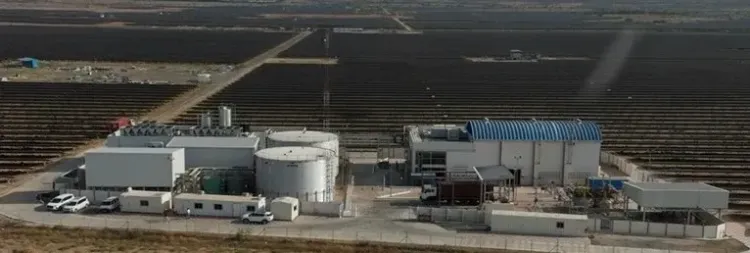Has Adani Launched India’s First Off-Grid Green Hydrogen Pilot Plant?

Synopsis
Key Takeaways
- First off-grid green hydrogen pilot plant in India located in Kutch, Gujarat.
- Operates completely on renewable solar energy.
- Features a Battery Energy Storage System for off-grid functionality.
- Supports India's ambition to become a global leader in green hydrogen production.
- Aligned with the National Green Hydrogen Mission.
Ahmedabad, June 23 (NationPress) Adani New Industries Limited (ANIL) announced the successful launch of India's inaugural off-grid 5 MW Green Hydrogen Pilot Plant located in Kutch, Gujarat, representing a significant achievement in the nation's shift towards clean energy.
This advanced facility operates entirely on solar energy and incorporates a Battery Energy Storage System (BESS), allowing it to function completely off the grid.
According to the company, this facility signifies a revolutionary step in decentralized and renewable hydrogen production.
“The ANIL pilot facility is India's first off-grid 5 MW green hydrogen installation, featuring a fully automated, closed-loop electrolyser system that dynamically adapts to real-time renewable energy inputs. This feature ensures operational flexibility, particularly in managing solar energy variability, while maintaining efficiency, safety, and performance,” the company stated.
This achievement underscores the Adani Group’s commitment to innovation, sustainability, and leadership in the burgeoning green hydrogen sector.
It aligns with India's goal to become a global leader in green hydrogen production and establishes a standard for renewable-powered industrial applications in challenging sectors.
The pilot project also serves as a proof of concept for ANIL's forthcoming Green Hydrogen Hub in Mundra, Gujarat—a pivotal initiative that will greatly contribute to India's low-carbon future.
Green hydrogen is anticipated to play a crucial role in decarbonizing industries such as fertilizers, refining, and heavy transport, aiding in the achievement of global net-zero targets.
This initiative is in line with the National Green Hydrogen Mission (NGHM), a flagship program by the Government of India aimed at reducing import reliance, boosting energy self-sufficiency, and accelerating the decarbonization of energy-intensive sectors—all in support of India’s 'Atmanirbhar Bharat' vision.
India aims not only to satisfy its domestic requirements but also to emerge as a significant global exporter of green hydrogen by 2030, making a meaningful contribution towards decarbonization efforts.
To facilitate this transition, the National Green Hydrogen Mission was inaugurated by the government in 2023 with an initial funding of $2.4 billion. India's objective is to attain energy independence by 2047 and achieve net-zero emissions by 2070.





